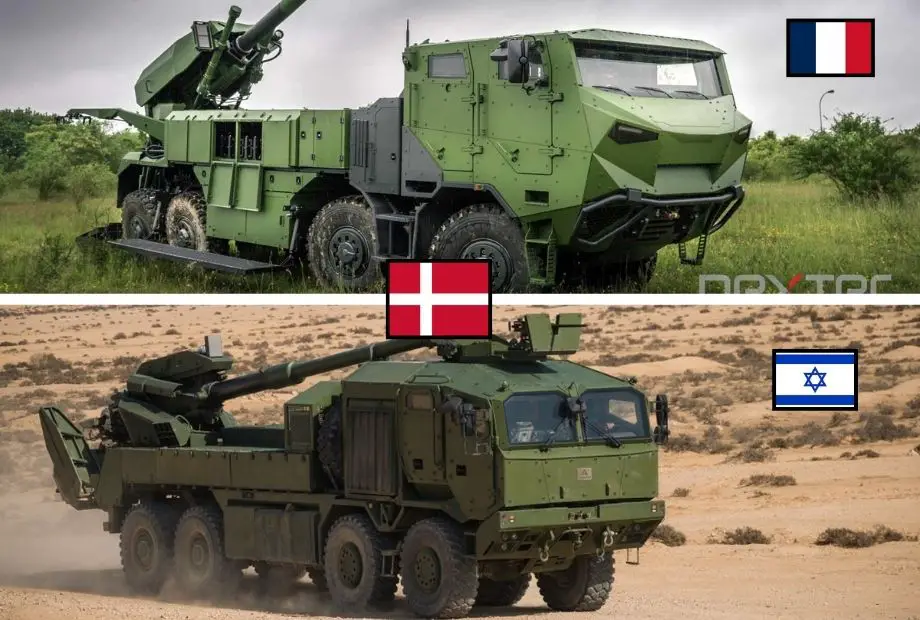The Danish Royal Army did not have the opportunity to test the nineteen CAESAr 8x8 vehicles it had ordered from Nexter (or KNDS France) in two phases, in 2017 and 2019. In January 2023, in an agreement with Paris, Copenhagen opted to donate them to Kyiv prior to their commissioning. Consequently, the French manufacturer could anticipate a new order to replace the 19 CAESAr 8x8s transferred to the Ukrainian army. This expectation was further supported by the training Danish artillerymen had received on these vehicles.
Follow Army Recognition on Google News at this link

Danish military staff chose Israeli self-propelled howitzer despite of deals concluding with France(Picture source Army Recognition )
French company Nexter KNDS was greatly surprised when Copenhagen announced its intention to turn to the Israeli competitor Elbit Systems to acquire self-propelled howitzers ATMOS for 119 million dollars.
Naturally, Nexter contested this decision, arguing that the CAESAr had already proven itself in combat, that Danish soldiers were able to deploy it quickly, and that it was compatible with Danish defense computer systems. "For these three reasons, it would be inappropriate for the ministry to instead buy an Israeli system that does not meet any of the criteria," it had argued.
The CAESAr 8x8, developed by Nexter Systems, a renowned French defense manufacturer, represents a significant leap in mobile artillery technology. This system, part of the broader CAESAr family, distinguishes itself with its robust 8x8 wheeled configuration, offering unmatched strategic and tactical mobility on the battlefield. Designed to provide rapid deployment and repositioning capabilities, the CAESAr 8x8's mobility is a key factor in its ability to employ shoot-and-scoot tactics effectively, thereby enhancing its survivability against counter-battery fire. At its core, the system wields a formidable 155 mm/52-caliber gun, capable of delivering precise fire support over distances up to 40 kilometers with standard ammunition and beyond 50 kilometers with rocket-assisted projectiles.
However, the Danish Ministry of Defence stood by its decision, developing two arguments, namely that the Atmos 2000 would be delivered quickly, that is within "this year [2023], or at the beginning of the next" and that their order would be linked to that of multiple rocket launchers PULS, also produced by Elbits Systems. The related contracts were then quickly signed, for a total amount of 252 million dollars. At the time we are writing these lines, an estimated delivery date is April 2024 for 7 pieces and late autumn 2024 for the 7 latest, according to the Danish newspaper Altinget, a source of the Danish government statement.
However, these purchases were open to criticism, some Danish deputies, whose agreement was necessary, felt that the government had forced their hand by presenting them with "wrong" information. The acting Minister of Defence, Jacob Ellemann-Jensen, had apologized... And the Permanent Secretary of the Ministry was dismissed. Yet, this affair has not stopped there since. Via a statement released on April 3, the Danish Minister of Defence, Troels Lund Poulsen, announced that the ATMOS 2000 howitzers will ultimately not be operational before 2026, due to their inability to "function in an integrated manner with the rest" of the units of the Danish Royal Army. This also applies to the PULS systems.
The Defense Command and the Ministry of Defence’s Material and Procurement Agency have stated that the preparation time of the vehicles after their delivery to Denmark had been extended from 6 to 18 months," it is specified in the statement. In short, the work that had been carried out for the commissioning of the CAESAr 8x8, especially to ensure the compatibility of communication and targeting systems, must be started from scratch for the ATMOS 2000.
As for the PULS systems, their implementation is expected to be much more costly than anticipated, the decision to acquire them not having taken into account the expenses related to personnel, ammunition, and necessary infrastructure. The amount of the bill could be more than one billion Danish kroner [134 million euros] higher than initial estimates. "It is deeply regrettable that the elected officials were not able to decide to buy the PULS system with full knowledge of the facts. We now risk ending up with a significant additional bill, which will have to be covered by the defense settlement funds," lamented Troels Lund Poulsen.
The circumstances under which the purchase of the ATMOS 2000 was decided are already the subject of an investigation. This should be expanded to include the PULS systems "to include the cost and delays" related to them.
Defense News April 2024
















